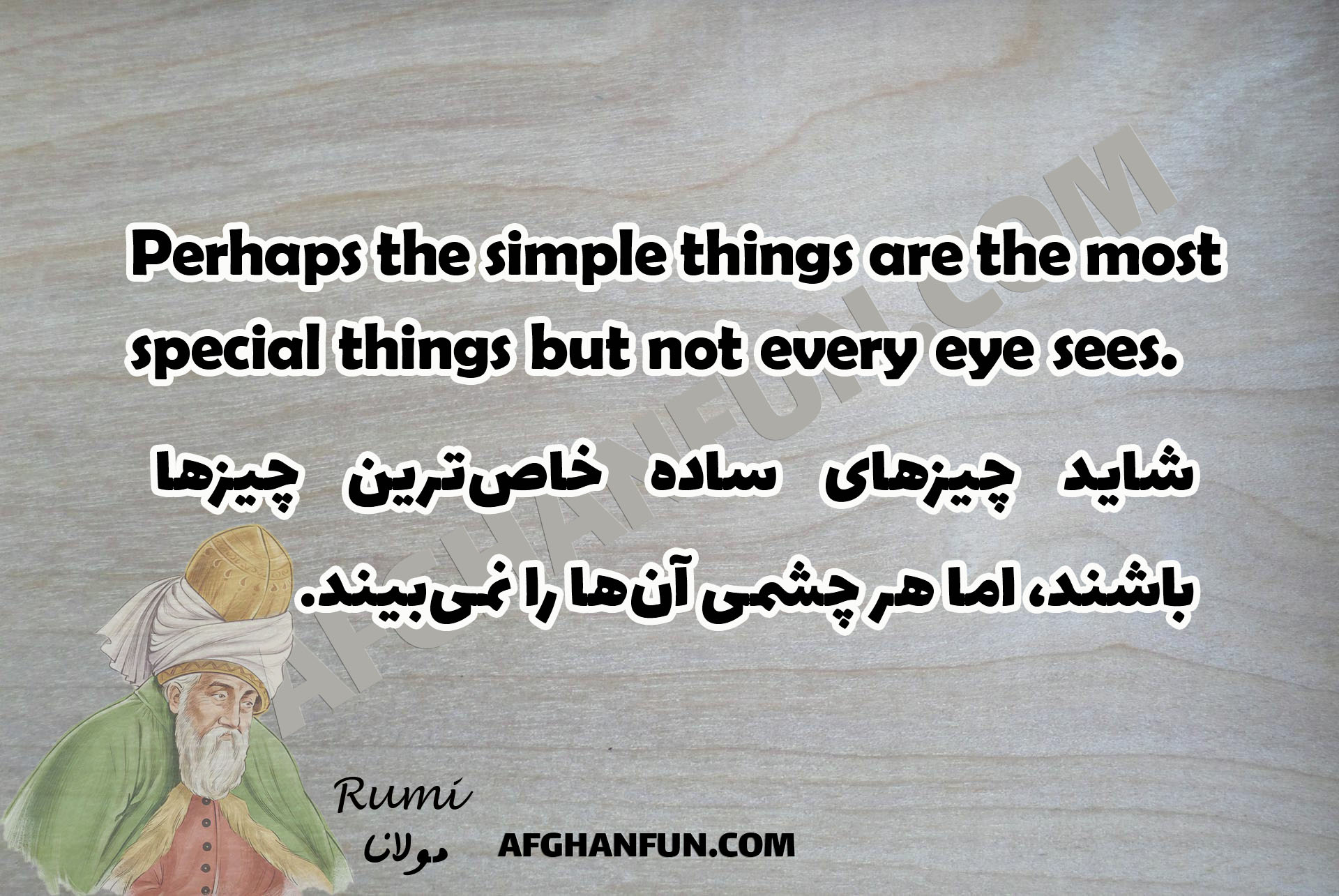Perhaps the simple things are the most special things but not every eye sees.
Rumi
Шояд чизҳои сода махсустарин чизҳо бошанд, вале на ҳар чашм онҳоро намебинад.
МАВЛОНО ҶАЛОЛУДДИН МУҲАММАДИ БАЛХӢ
Мавлоно таъкид мекунад, ки зебоӣ ва арзиши воқеии зиндагӣ дар содагӣ нуҳуфтааст. Аммо на ҳама метавонанд ин ҳақиқатро бубинанд, чунки бисёриҳо ба чизҳои печида рӯй меоранд ва аз моҳияти содаву ҳақиқии зиндагӣ дур мемонанд.
شاید چیزهای ساده خاصترین چیزها باشند، اما هر چشمی آنها را نمیبیند.
مولانا
مولانا در این نقل قول تأکید میکند که زیبایی و ارزش واقعی زندگی در سادگی نهفته است. با این حال، همه توانایی دیدن یا درک این حقیقت را ندارند، چرا که بسیاری از افراد درگیر پیچیدگیهای ظاهری هستند و از جوهره ساده و اصیل زندگی غافل میمانند.
لعل الأشياء البسيطة هي أكثر الأشياء تميزا ولكن ليست كل عين ترى.
مولانا جلال الدین محمد الرومي
يشير مولانا في هذا القول إلى أن الجمال والقيمة الحقيقية في الحياة تكمن في البساطة. ولكن ليس كل شخص يستطيع رؤية ذلك، لأن كثيرين ينشغلون بالمظاهر المعقدة ويغفلون عن جوهر الحياة البسيط والأصيل.
Deep Analysis of the Quote:
“Perhaps the simple things are the most special things but not every eye sees.” — Rumi
This quote captures a profound spiritual and philosophical truth. Rumi suggests that the most valuable and extraordinary aspects of life often lie in simplicity. However, the inability of “every eye” to perceive them points to the limitations of human awareness shaped by materialism, ego, or superficial distractions. Let us break this down further:
- The Value of Simplicity:
Simplicity, in Rumi’s perspective, represents purity, authenticity, and essence. It could be the joy of small acts of kindness, the beauty of nature, or the quiet peace of the present moment. These “simple things” transcend complexity and touch the soul directly, bypassing the noise of the world. - Not Every Eye Sees:
This phrase highlights the selective perception of human beings. Many people fail to notice or appreciate the simple and profound because their “eye” — a metaphor for awareness — is clouded by distractions such as greed, pride, or constant striving for more. Rumi implies that true vision comes not from the physical eye but from a deeper, spiritual insight. - Spiritual and Mystical Undertones:
For Rumi, rooted in Sufism, simplicity is closely tied to divine truth. The “special things” are manifestations of the divine within the ordinary, but only those who have cultivated inner clarity and humility can recognize them. This aligns with Sufi teachings about the importance of detaching from worldly illusions to perceive the divine essence. - Relevance in Modern Life:
In today’s fast-paced, consumer-driven world, Rumi’s words remind us to pause and appreciate the understated wonders around us — the laughter of a child, the rustling of leaves, or the comfort of silence. The ability to “see” these simple joys requires mindfulness and a conscious effort to slow down and reconnect with the essence of life.
In essence, Rumi challenges us to shift our perspective and embrace simplicity as the gateway to profound beauty and fulfillment. The “special things” are always present, waiting for us to truly see.











